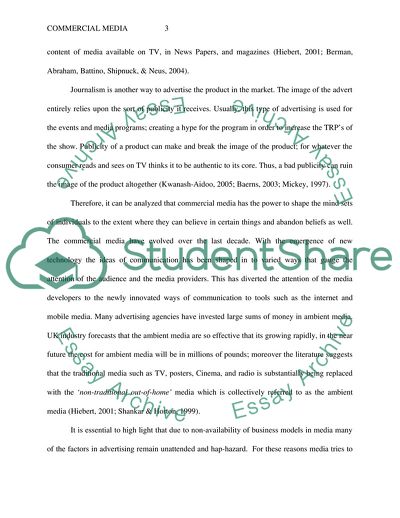Cite this document
(Can Commercial Media be Ethical Report Example | Topics and Well Written Essays - 3250 words - 1, n.d.)
Can Commercial Media be Ethical Report Example | Topics and Well Written Essays - 3250 words - 1. https://studentshare.org/media/1787918-can-commercial-media-be-ethical-be-sure-to-draw-on-each-of-the-module-topics-to-in-answering-the-question-and-use-artefacts-from-your-portfolio-to-illustrate-your-argument
Can Commercial Media be Ethical Report Example | Topics and Well Written Essays - 3250 words - 1. https://studentshare.org/media/1787918-can-commercial-media-be-ethical-be-sure-to-draw-on-each-of-the-module-topics-to-in-answering-the-question-and-use-artefacts-from-your-portfolio-to-illustrate-your-argument
(Can Commercial Media Be Ethical Report Example | Topics and Well Written Essays - 3250 Words - 1)
Can Commercial Media Be Ethical Report Example | Topics and Well Written Essays - 3250 Words - 1. https://studentshare.org/media/1787918-can-commercial-media-be-ethical-be-sure-to-draw-on-each-of-the-module-topics-to-in-answering-the-question-and-use-artefacts-from-your-portfolio-to-illustrate-your-argument.
Can Commercial Media Be Ethical Report Example | Topics and Well Written Essays - 3250 Words - 1. https://studentshare.org/media/1787918-can-commercial-media-be-ethical-be-sure-to-draw-on-each-of-the-module-topics-to-in-answering-the-question-and-use-artefacts-from-your-portfolio-to-illustrate-your-argument.
“Can Commercial Media Be Ethical Report Example | Topics and Well Written Essays - 3250 Words - 1”. https://studentshare.org/media/1787918-can-commercial-media-be-ethical-be-sure-to-draw-on-each-of-the-module-topics-to-in-answering-the-question-and-use-artefacts-from-your-portfolio-to-illustrate-your-argument.


